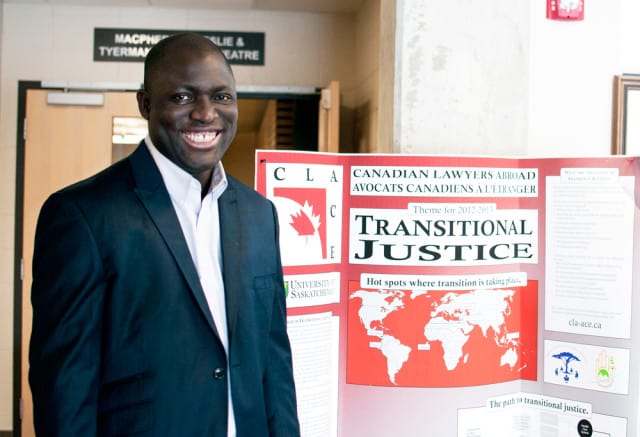
Kay Adebogun, the lawyer of Victoria Ordu and Ihuoma Amadi, shared their deportation story with U of S students on March 11. Adebogun hopes that keeping their fight relevant will give the Nigerian students a shot at staying in Canada and finishing school.
Two Nigerian students from the University of Regina who face deportation are still nervously holed up in a church while their lawyer, Kay Adebogun, works to keep the case a top priority with government officials.
Adebogun, who represents Victoria Ordu and Ihuoma Amadi, spoke at the University of Saskatchewan March 11 about recent political issues concerning immigrants and refugees in Canada and the two female students’ deportation story.
In 2011, Ordu was hired to do product demonstrations in a Regina Walmart. She worked for a couple of weeks but quit as soon as she found out that the Social Insurance Number she was given did not allow her to work off-campus. Weeks after she quit, the Canadian Border Services Agency arrested her.
Amadi began working at the same Walmart a couple weeks after Ordu quit, also without a work permit. She was arrested at work and escorted out by the CBSA.
The women received orders to leave in November 2011, which gave them 30 days to leave Canada of their own accord. They stayed so they could finish their studies at the U of R without losing their full scholarships from the Nigerian government.
Ordu and Amadi received deportation orders June 19, 2012, and immediately sought refuge in a Regina church. Almost nine months have passed and the women are still in hiding.
Adebogun informed U of S students that changes have recently been proposed to Citizenship and Immigration Canada that will allow international students at some institutions to work off-campus without a work permit. CIC will also hold the authority to request confirmation from international students that they are registered as full-time students. If passed, the changes will come into effect in January 2014.
Currently, international students with student permits are only required to show intent of enrolling in classes to stay in Canada, and do not need to be enrolled throughout the duration of their stay.
The changes made to the CIC will help international students find employment, but they will not affect Ordu or Amadi’s case, Adebogun told the Sheaf. The students’ deportation orders overrule anything else.
Amadi and Ordu have not denied their infraction, but are seeking a lighter punishment than deportation. Adebogun says the government should dismiss their case and that nine months of near-detention is punishment enough.
“Considering the circumstances, the minister should be able to grant them amnesty on this one,” Adebogun said.
“We’re hoping time will heal the wound.”
For the time being, Adebogun knows that Regina-area Members of the Legislative Assembly and Members of Parliament have been lobbying on behalf of the Nigerian students’ cause and he will continue pressuring the government to be sympathetic, something which may be hard to do with the passage of Bill C-31.
Adebogun’s March 11 lecture was focused on Bill C-31, the Protecting Canada’s Immigration System Act. He discussed both the act and the effects it is likely to have on refugees coming to Canada. Bill C-31 passed in June 2012.
When entering Canada, people hoping for refugee status must claim that they are refugees and give supporting reasons for their case. With Bill C-31, claims to enter the country as a refugee can be denied if the country of origin is on list of countries considered “safe.” Designated countries tend to have low numbers of refugees coming from them, are recognized as respectful of human rights and may provide state protection for their citizens.
If a refugee’s claim is denied, they can be immediately detained.
Adebogun is critical of the new detention laws, saying that anybody, including children, can be detained for an undetermined amount of time, from days to years, and that the detention centres scattered across the country are like “mini prisons.”
Bill C-31 gives the minister of citizenship, immigration and multiculturalism the right to revoke refugee status if that individual’s country of origin is later designated safe. If refugees were misrepresented while acquiring their permanent residency or refugee status, either may be revoked and the person may be ordered to leave.
After spending several years in Canada, refugees are often well-established in the country. At the lecture, Adebogun expressed concern that parents who have had their refugee rights revoked might be ordered to leave while their Canadian children would be forced to stay.
Other changes in Bill C-31 include reducing the time refugees have to submit their basis of claim to the Immigration and Refugee Board of Canada to 15 days following the initial claim they make upon entry. Hearings for refugees from designated countries of origin must be held within 45 days after a case is referred to the board, while other refugees have 60 days.
Adebogun said that imposing such time limits will result in refugees being unfairly denied a legal stay in Canada.
“It will lead to poor preparation, extra work for the Council of Refugees,” Adebogun said. “In the process of trying to push some of these cases through, a thorough job will not be done.”
—
Photo: Raisa Pezderic/The Sheaf